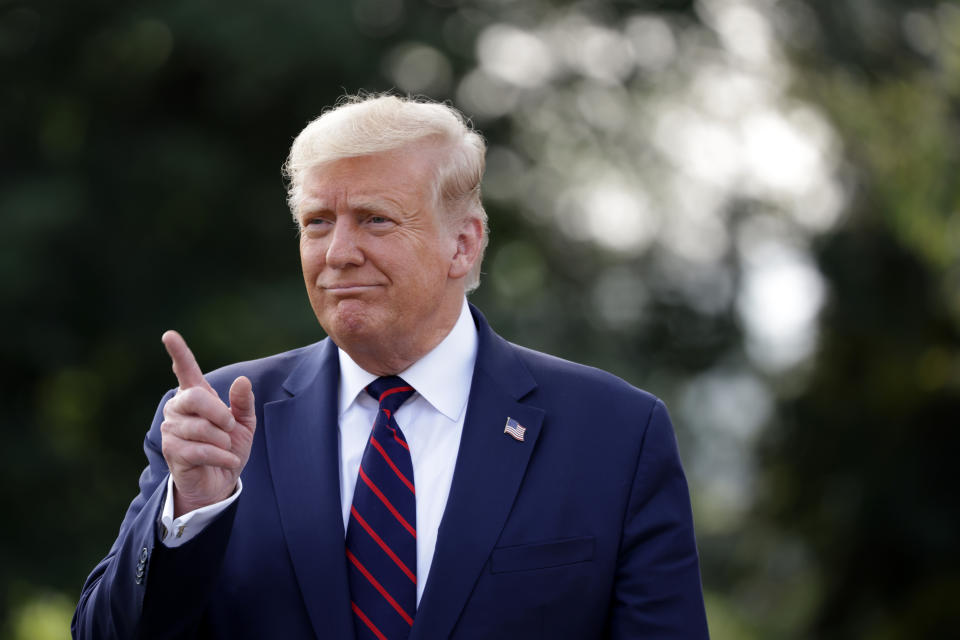Analyst: Neither Trump or Biden care about soaring federal debt, deficit
The U.S. government is awash in debt and red ink — and neither President Donald Trump or his Democratic challenger appear bothered by the status quo, an analyst told Yahoo Finance on Wednesday.
Last week, the Treasury released data showing how the COVID-19 pandemic helped push the U.S. federal budget deficit above $3 trillion for the first 11 months of fiscal 2020, a rate more than double the prior full-year record.
In previous years, the federal deficit — and the mountain of IOUs to investors it signified — would figure prominently in a presidential campaign. But fast forward to 2020, and neither Trump nor former Vice President Joe Biden is addressing deficit spending.
In fact, they seem to be embracing it, Greg Valliere, AGF Investment’s chief strategist told “On the Move” in an interview.
“If Trump wins, he wants to make his tax cuts permanent. He wants to spend more money on things like infrastructure,” Valliere said.
Yet if Biden prevails — as recent polls suggest is likely, “he might raise taxes but not to reduce the deficit. He'll raise taxes because he has programs he wants to spend for,” Valliere added.

Valliere estimated that total U.S. debt will easily surpass $30 trillion by the middle of the decade, due to deficits of more than $3 trillion this fiscal year and another $2 trillion in fiscal 2021.
However, many analysts have questioned whether either candidate have the political will to get the debt under control with servicing costs so low. Not only is the federal government borrowing and spending at record levels, the Federal Reserve is committed to keeping its foot on the pedal of monetary policy — neither of which has resulted in nudging up inflation or bond yields.
On Wednesday, the Fed vowed to keep interest rates near zero until prices rise, yet Valliere, like some other market observers, warned that the bond market could eventually rebel.
“At some point it will have a negative impact on our economy. And you've got two candidates running for president who both will not be shy about spending even more,” he said.
The lack of concern about deficits is rooted in Modern Monetary Theory (MMT), an economic framework that until very recently had been perceived as out of the mainstream. Valliere wrote in a note to clients that MMT disregards spending when interest rates have bottomed out, and demand for Treasury paper is insatiable.
Slashing spending triggers political blowback, and never goes over well among the electorate impacted by cuts, which is why politicians frequently opt to kick the can down the road. Few, if any, Republicans are calling for cuts to spending, tax hikes and reducing the growth of Social Security and Medicare perceived as necessary to curb the red ink, Valliere said.
“So I don't see either party really being that serious right now about deficits and I would come up with a bottom line that by the middle of this decade, total [U.S. government] debt will exceed $30 trillion,” he said — and it may yet end with a reckoning.
“It's not a problem until it will be at some point,” he added.
Yvette Killian is a producer for Yahoo Finance’s On The Move. Follow her on Twitter at @yvette_killian
READ MORE:
Financial markets need to 'start thinking about a blue wave': strategist
Brands beware: Lessons from the downfall of Aunt Jemima and Uncle Ben
'A risk for the future': How warming oceans are disrupting America's seafood supply
Read the latest financial and business news from Yahoo Finance
Follow Yahoo Finance on Twitter, Facebook, Instagram, Flipboard, SmartNews, LinkedIn, YouTube, and reddit.